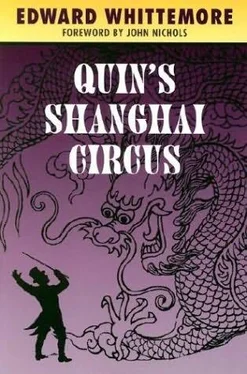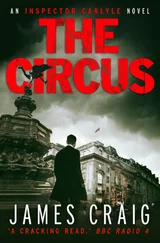Edward Whittemore - Quin’s Shanghai Circus
Здесь есть возможность читать онлайн «Edward Whittemore - Quin’s Shanghai Circus» весь текст электронной книги совершенно бесплатно (целиком полную версию без сокращений). В некоторых случаях можно слушать аудио, скачать через торрент в формате fb2 и присутствует краткое содержание. Жанр: Фэнтези, на английском языке. Описание произведения, (предисловие) а так же отзывы посетителей доступны на портале библиотеки ЛибКат.
- Название:Quin’s Shanghai Circus
- Автор:
- Жанр:
- Год:неизвестен
- ISBN:нет данных
- Рейтинг книги:3 / 5. Голосов: 1
-
Избранное:Добавить в избранное
- Отзывы:
-
Ваша оценка:
- 60
- 1
- 2
- 3
- 4
- 5
Quin’s Shanghai Circus: краткое содержание, описание и аннотация
Предлагаем к чтению аннотацию, описание, краткое содержание или предисловие (зависит от того, что написал сам автор книги «Quin’s Shanghai Circus»). Если вы не нашли необходимую информацию о книге — напишите в комментариях, мы постараемся отыскать её.
Quin’s Shanghai Circus — читать онлайн бесплатно полную книгу (весь текст) целиком
Ниже представлен текст книги, разбитый по страницам. Система сохранения места последней прочитанной страницы, позволяет с удобством читать онлайн бесплатно книгу «Quin’s Shanghai Circus», без необходимости каждый раз заново искать на чём Вы остановились. Поставьте закладку, и сможете в любой момент перейти на страницу, на которой закончили чтение.
Интервал:
Закладка:
My mother saw it all. She saw him descend into the circus where lust and teeth and the wail of a victim are joined together in a single act, where animals run free and bodies pile up while a band plays and a juggler lifts torches end over end. She saw the performance rage and die, saw him step out of the ring and move away from the life where once he had ruled.
A monotonous juggler. A discordant band. A herd of snoring animals.
She shivers from the cold. After so much meat the animals will sleep for days. Even the jackal has closed his eyes. The band is sleeping too, lost in the nirvana of an opium dream. The spotlight still lights the juggler, but less clearly now. The torches give off an oily smoke and burn low as the juggler falls asleep beside them.
The spotlight is gone, the gloom begins to lift. From the skylight above her head dawn dimly falls on the interior of the empty warehouse.
After that? After my father stepped out of the ring he was never seen again. Armies were marching, war was coming. The great circus was beginning in which millions would have a part to play, an act, a specialty. The audience in Shanghai was soon forgotten, as was my father’s night in a deserted warehouse.
Those people, you see, would have died soon anyway. They were looking for death, and one way or another they would have found it. They were on the edge, voyeurs a step away waiting for the final spectacle. They must have known they had gone to the warehouse that night to witness their own deaths. After all, there was nothing else left to see.
So it wouldn’t be right to say they were victims that night. There were only two victims. The ring and the bed were theirs, the circus was theirs, the sounds and the smells and the horrors were theirs.
Thus when dawn came she gripped the trapeze and took a last breath. She balanced on her toes and the trapeze swung wide as it had many times before. And as she had many times before, she left it and turned the graceful, loving figures in the air.
Turned and turned through three somersaults, hung still where there was no hand to catch her. Still for a moment, one moment before she spiraled down and down.
Kikuchi-Lotmann’s glasses had fogged. He cleaned them on his necktie, his eyes black dots.
I have never forgotten, he said in a low voice. I have remembered and lived accordingly. How could it be otherwise?
Heaven and water go their opposite ways,
Thus in all transactions the superior man
Carefully considers the beginning.
Not mine and not a haiku either. That one’s from the old book. To the ancient Chinese the superior man was the ordinary man, that’s what it means. So I have remembered the way they lived and the torment it brought them and done the opposite, doing everyday business in a businesslike way, putting the war and the passions they knew behind me, satisfying myself with the mundane affairs of ordinary business because I have considered my beginning, my father, and where it led him.
Where did it lead him? said Quin.
To the interior of China I suppose, the coastline was already at war. But where exactly would be impossible to say. Wandering the trails of those learned Arabs perhaps, those gentle Nestorians and adventurous Greeks. Or rather I’d like to think that. As with the audience in the warehouse that night, it would be better not to know the end. It would be better to think he’s still wandering.
Kikuchi-Lotmann smiled.
And so I do. I prefer to think that somewhere in the vastness of central Asia, beyond those interminable arid wastes where the paths are too old and new for the rest of us, there is a home for a soul such as his. A small resting place beside a stream, under a tree, where a man who has dreamed and failed can surrender his ghost without regrets. I prefer to believe that.
Kikuchi-Lotmann creaked out of his chair and stretched his arms. The shadows were gone. One final time he changed his necktie. When he turned to Quin he was smiling.
Well, have we learned anything tonight? Have we discovered what Father Lamereaux might have had in mind when he sent you here?
I’m not really sure, said Quin, but one thing bothers me. If he knows the story, which he must, why didn’t he tell it to me himself?
Perhaps because he’s a holy man and a holy man is supposed to guide, not teach. Or it might have been just a whim of his. In any case we followed the holy man’s directions and did what was expected of us.
Quin shook Big Gobi by the shoulder and told him it was time to leave. As he stood Kikuchi-Lotmann noticed the cross hanging from his neck.
That’s an old piece. Where did it come from?
It was given to him in America, answered Quin.
Once as a boy I saw a cross much like it. It belonged to Rabbi Lotmann’s twin brother, who apparently treasured it greatly. He always wore it hidden under his uniform, which was odd for a Japanese who wasn’t a Christian, who was an ultranationalist in fact. It wouldn’t have gone well for him in the army if anyone had known about it.
Who was he? said Quin.
A very powerful General who was killed in China in 1937. He inherited the title of Baron Kikuchi when Lot-mann became a Jew.
The Policeman
As for where they go and why, we cannot be sure of such things. There are no tracks in such a barren waste. The sandstorms blow, the sun sinks, rivers disappear, and their camels are lost in darkness. Therefore the truth must be that the routes of such men are untrace-able, their missions unknowable, their ultimate destinations as invisible as the wind.
If the Son of Heaven is to continue to rule with integrity, we must defend our borders at all costs from such men.
—A Han dynasty account of the caravans in the Gobi Desert
The young bodyguard whom Kikuchi-Lotmann called the student stood in a long line of people waiting for a movie theater to open. It was his day off and he didn’t have to be back at the dormitory until muster the following morning.
All of the gangsters who worked for Kikuchi-Lotmann lived together in the company housing project, a large concrete block of windowless cubicles built around a central courtyard. Muster came at six o’clock, when a bugle sounded over the public address system. The gangsters fell in at attention in the courtyard and the roll was taken. A physical fitness expert then led them through a rigorous series of push-ups, pull-ups, and rope-skipping. The calisthenics ended at seven o’clock with the gangsters maneuvering around the courtyard in military fashion singing the company marching song, Kikuchi-Lotmann Enterprises Forever .
The supreme present,
Nothing compares to the present.
Unless it’s the past.
The lyrics were much too brief for the music, which one of the older employees claimed was similar to a tune he had heard in Singapore before the war, a song known at that time, there, as Roast Beef of Old England .
Hato hated calisthenics and he hated the dormitory. He hated the young whore, a mental health specialist, who burst into his cubicle three times a week dressed as an elderly woman, her face lined with gray make-up to give her the semblance of age, her breasts taped down to appear flat, her belly daubed with green chalk, her legs painted with varicose veins. The young woman yanked him to his feet and pushed him away from the door. He had to spend an hour with her.
Up against the wall, mother-fucker, she shouted as she charged.
Hato didn’t have any special feelings about his mother, so the therapeutic effect of the session was lost on him. He would have preferred a girl who looked like a movie star.
Читать дальшеИнтервал:
Закладка:
Похожие книги на «Quin’s Shanghai Circus»
Представляем Вашему вниманию похожие книги на «Quin’s Shanghai Circus» списком для выбора. Мы отобрали схожую по названию и смыслу литературу в надежде предоставить читателям больше вариантов отыскать новые, интересные, ещё непрочитанные произведения.
Обсуждение, отзывы о книге «Quin’s Shanghai Circus» и просто собственные мнения читателей. Оставьте ваши комментарии, напишите, что Вы думаете о произведении, его смысле или главных героях. Укажите что конкретно понравилось, а что нет, и почему Вы так считаете.












